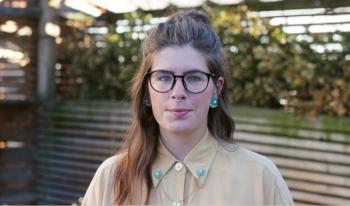Image Caption
Summary
Local Journalism Initiative Reporter
Windspeaker.com
From a dream to an award-winning short story to a novel to be published by HarperCollins Canada. It’s all “surreal,” says author Jessica Johns.
Johns’ debut novel “Bad Cree” was the subject of a bidding war between three publishing houses.
“Everybody connected with my work in such a deep and meaningful way,” said Johns.
But she was drawn to work with HarperCollins because of the connection she felt with the editor Aeman Ansari.
Johns felt that same connection with agent Stephanie Sinclair from the CookeMcDermid Agency. In fact, after reviewing the list of authors Sinclair represented – including Billy Ray Belcourt, Lee Maracle and Joshua Whitehead – Sinclair was the only agent Johns approached.
They also connected on another level: both women are Indigenous. Johns is a member of the Sucker Creek First Nation located in Treaty 8 territory in Alberta, and Sinclair is of Cree, Ojibwe and settler descent.
“As an Indigenous person I think I have a fundamental understanding of some of the underlying themes that many other writers that I'm working with are talking about in a way that I don't know another agent would,” said Sinclair.
But it was the story Johns was telling that pulled Sinclair in.
“I think we need more books that are truthful in all of its complexities of characters, complexities of plots and scenarios but that are also infused with joy, and I think that Jessica struck that balance perfectly. I think that’s really hard to find. I found it immediately just wonderful to read,” said Sinclair.
The book also fit into Sinclair’s goal to curate a list of works with “political leanings” as says her profile on the literary agency’s website.
“In many ways (Johns’) sort of normalizing and humanizing an urban Indigenous experience in a way that I think challenges how people think about stereotypical Indigenous people. I think that she's also offering insight and perspective into the joy that exists within many, many Indigenous families we don't hear enough about,” said Sinclair.
“What I hope to accomplish with my list is to have the books that I contribute to bringing into the world change the conversation and change the landscape and challenge how people think about each other generally not just Indigenous people,” Sinclair said.
The short story “Bad Cree” won the Writers’ Trust McClelland & Stewart Journey Prize in 2020.
Johns said when she was writing the short story it had not been her intention to turn it into a novel.
“Once I finished it, the story didn't really leave me. I felt like there was more to say. The characters were still kind of there for me and there is more I wanted to do,” she said.
Writing the novel was “completely different” than writing a short story.
“The short story was supposed to be short, so I’m cutting words, I’m trying to condense and make it concise. And with the novel I'm trying to open it up. I'm trying to expand. I'm trying to dig into scenes,” explained Johns.
She is also a poet and says her poems are more narrative and her short stories integrate poetic elements.
“Bad Cree” is about a Cree woman who is able to take things to and from the dream world. The ability manifests suddenly and she doesn’t know why. When the dreams escalate and become frightening she returns home to Treaty 8 territory in northern Alberta to find answers. She hasn’t been home for a while because of family issues but upon her return she reconnects with her mother, sister, aunt and cousin. They band together to figure out what’s going on, sort through why this is happening and what she has to do.
Considering the content of the short story-turned-novel, it’s not surprising that the concept came from a dream Johns had.
The supernatural, mystical aspect of novels have long been a popular draw for readers.
“I think right now there may be a greater appetite for sure,” said Sinclair. “There were many, many publishers who were very eager to talk to her about it.”
“Bad Cree” won’t be on the bookshelves until 2023.
“It’s an industry standard actually which Jessica is experiencing. We sell the book and then the editor takes a year or two to work on the substantive changes, the stylistic changes, the copy edit, then getting it all typeset and designed and then it goes to print and gets published,” said Sinclair.
Substantive edits ensure that characters are fully developed, that there are no holes in the plot line, and that the point of view remains consistent.
Those “big picture” changes, said Sinclair, don’t change Johns’ story. “It just strengthens it.”
Johns, who resides in Vancouver, will be balancing that ongoing work with her job as managing editor of the literary magazine “Room.”
“Working on the novel is worked into my everyday life. I do it every single day. I have deadlines with my editor. It’s changed my immediate goals,” she said.
Sinclair sees her job as matchmaker between author and publisher and it’s a role she’d like to have with Johns for a long time to come.
“I hope that we will work together for the next 20 years … and I hope to see her next many, many books,” said Sinclair.
Local Journalism Initiative Reporters are supported by a financial contribution made by the Government of Canada.

